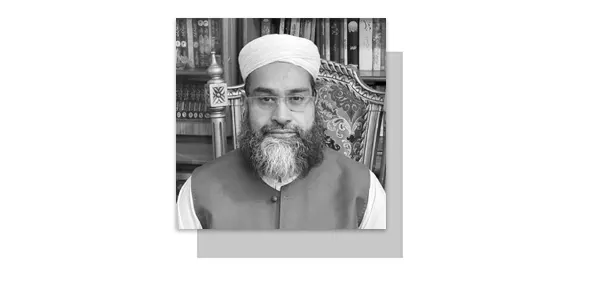Hafiz Muhammad Tahir Mahmood Ashrafi Chairman Pakistan Ulema Council
We congratulate King Salman bin Abdulaziz, the Custodian of the Two Holy Mosques, Crown Prince Muhammad bin Salman, and the entire nation on the Kingdom’s 93rd National Day.
The day comes at a moment when the country has successfully parted ways with outdated governance and legal infrastructure to build a modern and progressive country. Achieving these milestones may not have been possible if King Salman bin Abdulaziz al Saud had not placed trust in his son’s abilities to manage the affairs of the government at a time when the Western hold and sectarian divisions within the Middle East had put the sustainability of the Kingdom at risk.
MBS, as the crown prince is famously referred to, having followed the foreign policy of regional peace and development, reduced the influence of the US-led Western countries by taking ownership of political skirmishes and sectarian divisions in the region. While looking inward to weed out an archaic governance model, the Kingdom sensed that it would have to neutralize hostile elements in the neighborhood for sustainable progress. It was in this spirit that MBS extended a hand of friendship towards Iran, listened to the rogue Yamani forces to end the civil war, reinstated Syria’s membership in the Arab League, facilitated ceasefires in Sudan, hosted Ukrainian President Volodymyr Zelensky during the Arab League Summit in Jeddah in mid-May and in his latest move is going full force to find a permanent solution to the Israel-Palestine conflict.
The Muslims also look up to MBS to play a similar role in resolving the Kashmir issue, without which a cordial relationship cannot happen between Pakistan and India. Even for regional peace in Asia, the solution to the Kashmir issue in the context of the United Nations resolution is essential.
Talking to Fox’s Special Report program about the Palestinian issue, MBS said it was “very important” to Riyadh. “We need to solve that part,” he said when asked what it would take to get a normalization agreement. “We got to see where we go. We hope that will reach a place, that it will ease the life of the Palestinians, get Israel as a player in the Middle East,”
For many decades, until MBS took the reigns of the Kingdom in his hands, despite a windfall of wealth generated from oil and tourism, the country depended on the outer sources for human resources, entertainment, and academic successes. Women were seen far and few between on important positions, men in many fields discriminated against them, they could not drive cars, and their morality was judged merely by their outfits. MBS dismantled this status quo paradigm and allowed women to participate fully in the economic and financial development of the Kingdom. As a result, the proportion of Saudi women engaged in the workforce has doubled over the past four years, reaching an impressive 33 percent. This surpasses the 30 percent target set in the 2030 plan and the 27 percent regional average for the Middle East and North Africa.
The decision to open the country for foreign investments in sports, entertainment, and academia led to the establishment of sports complexes, cinemas, and institutions for research and development. These efforts have borne fruit through monumental projects such as NEOM, Diriyah, Qiddiya, and Red Sea Global.
The country’s opening up to the outside will eventually reduce Saudi Arabia’s dependence on petroleum, which neither is an infinite resource nor a viable option to depend upon in a climate change-conscious world.
In pursuant to the Kingdom’s Vision 2030, Saudi Arabia, as a responsible member of G20, has pledged to reduce annual carbon emissions by 130 million tons by 2030. In line with this mission, in November 2016, the country officially embraced the Paris Agreement to participate in the collective endeavor to minimize the fallouts of climate-related changes.
Saudi Arabia’s Vision 2030 stands on three pillars. The first pillar is the Kingdom’s status, which places it at the heart of the Arab and Islamic world. The second pillar is the country’s determination to become a ‘global investment powerhouse.’ The third pillar hinges on the country’s strategic location that connects it with three continents, Asia, Europe, and Africa, making the Kingdom an epicenter of trade.
The arrival of foreign investment and the opening up of the private sector for employment opportunities, along with reforms in labor laws and market-led legal initiatives, have made doing business and establishing industries an easy affair. According to the IMF projects, the country is on its way to registering a remarkable GDP growth of 7.6 percent in the 2022-23 financial year.
The people of the Kingdom are enthusiastic about hosting Expo 2030. They have lent complete support to MBS, laying in him unwavering trust and determined to help him realize his vision of 2030 that would take Saudi Arabia’s growth trajectory to a level where it would become a power to reckon with in the Middle East.
At this juncture, we thank Saudi Arabia for its long association with Pakistan. Saudi Arabia and its counterparts in the Gulf States have been available to deliver Pakistan from economic hardships and financial moorings. Pakistan’s nuclear arsenals and its security forces act as a deterrent against regional security challenges.
Muhammad bin Salman is no passive ruler of a rich country. He is a vibrant enthusiast with a clear vision to work in peace and harmony with his partner countries and neighbors. As a defender of peace and development and an important stakeholder in the matters that shape and reorder the global governance system, MBS is destined to reshape the contours of the Islamic World for the better.









